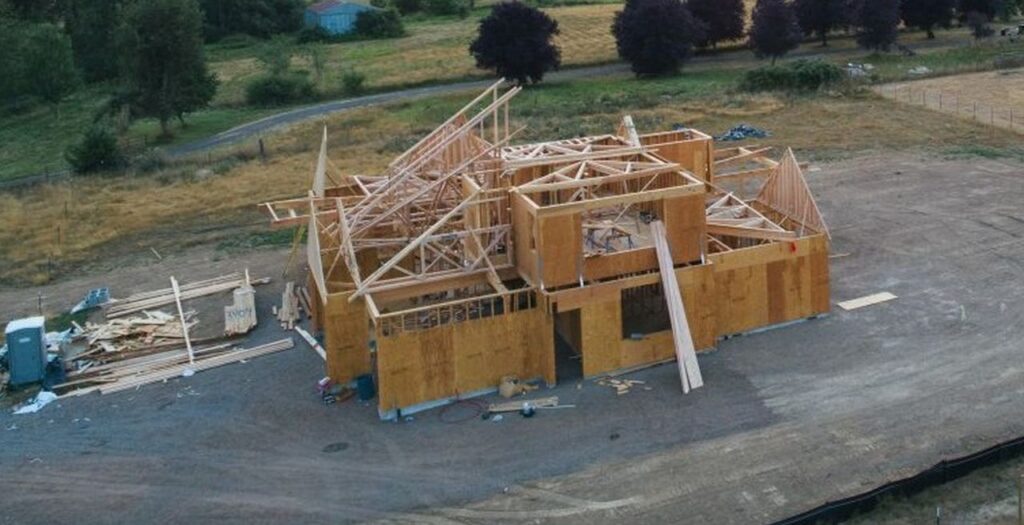Do you want to construct a new house on your current lot? There are many things to think about before buying land so that you know you're making a good decision.
It's easy to feel overwhelmed by the prospect of purchasing land due to all the factors that must be considered, from zoning and privileged access restrictions to the presence or absence of electricity and water infrastructure.
If you want to be sure that buying land and building your dream home doesn't turn into a nightmare, we'll cover all the bases and make sure you know what to look out for.
What follows is a comprehensive guide to purchasing land for building.

What You Should Know Before Purchasing Land
You've finally decided to construct the home of your dreams, but you need somewhere to place it. It's not as easy as perusing the want ads to find a vacant lot on which to construct a house. While looking to buy a lot, it's important to keep a few things in mind. The first step? Repeatedly investigate.
If you don't want to do all the legwork yourself, one alternative is to go via a builder to locate a suitable lot. But if you're prepared to begin your search (and study), you can utilise the information below to learn more about the home lots available in your area.
The Location
- Expansion – If you are searching for lots close to where you already reside, you probably have a good notion of where you want to construct your new house. Perhaps it's surrounded by stunning scenery or a promising new community. Check your city's comprehensive plan to determine which regions are slated for expansion in the coming years, even if you have a mental feeling of the location you'd want. Look at the progress of public transportation and bike-sharing programmes in your area, too.
- Readiness - Not all lots are ready to the same extent for constructing a home. There are three types of available lots: buildable, unimproved, and raw. Undeveloped land is bought as an investment and not for immediate construction. Lots that have not been developed may experience more complications and costs than those that have already been anticipated since they lack even the most fundamental infrastructure. The construction schedule will be pushed back for many months to account for the work that must be done to prepare an unimproved lot for building (and it is more difficult to secure a bank loan for this kind of a lot). Lots that are "build-ready" are prime locations for residential development (as long as all necessary permits have been obtained). This form of property is the most attractive to banks since it presents the least risk.
- Inundation Zones – Water damage can ruin your home and lifestyle. The annual premium for flood insurance in higher places can range from several hundred to several thousand dollars. Yet a home constructed in a flood plain may be hard to sell in the future. These dangers can be avoided by checking on Federal Emergency Management Agency's website to see if the lot location is in a flood zone. Find a property classified as Zone C to Zone X to reduce your exposure to flooding.
The Surveying
A licenced surveyor can conduct the necessary study to pinpoint the precise limits of a property. No of how recently the prior survey was conducted, buyers ought to constantly have a new one done. Broker and attorney: "Only the party identified in the surveyor's certificate may rely on the survey."
The survey is only for the benefit of the parties specifically identified in the certification; anyone else who relies on it does so at their own risk. Having the buyer listed as a party inside the surveyor's certificate can prevent disagreements about the property's boundaries or the precise placement of easements as well as other features.
Ordinances And Zoning
Verify the lot's residential construction eligibility before making any purchases. You may find out the lot's zoning status immediately by using an online tool provided by your city or county. More often than you might think, people buy land that won't be used as a residence.
If the property you're interested in is located in a city or county, it's a good idea to learn about the local government's long-term plans for land use and any planned road upgrades. Animal control, law enforcement, parks, roadways, and even trash collection and recycling are all governed by rules in cities and counties. It's a good idea to find out ahead of time what laws will be enforced on your property.
Homeowners Associations And Deed Restrictions
What can be built on the land is constrained by more than just zoning regulations. Many of the available lots are located within established developments with associated restrictions. There is probably a homeowners association if you're looking at an empty lot in a development or an already constructed community. HOAs not only regulate the community but also typically charge expensive dues to its members.
Anything from the colour of your front door to the types of pets you can keep may be subject to these regulations. You may rest easy knowing that your neighbour won't be able to turn their home into a petting zoo by painting it bright pink - top to bottom. Communities with HOAs typically have great amenities like recreation centres and swimming pools.
Private agreements between the seller of land and the buyer of property are called covenants or deed restrictions in subdivisions. Limits on the size of fences, the removal of trees and other vegetation, the construction of new buildings, and the addition of additional bedrooms are all violations of deed restrictions. The property deed and master deed for a subdivision should contain the subdivision's deed limitations, as well as the HOA's rules and regulations.

The Liens
A lien is a claim notice recorded against the legal title of property to ensure payment of an outstanding debt. A portion of the proceeds from the property's sale is given to the person who has not been paid. The majority of land or building owners have no idea a lien even exists on their property.
If a lien has been filed against a property, it can be easily discovered through an online search of the town recorder's, clerk's, or tax assessor's website. You will be unable to purchase the land in question until the outstanding loan is paid and the lien is removed.
The Utilities
Electricity, gas, phones, the internet, water, and sewage are all examples of essential utilities. If the property doesn't already have access to public utilities, installing them can be a major inconvenience (at best) on top of being costly and time-consuming.
With a build-ready lot, you won't have to worry about putting in utilities. You can still achieve this goal if, indeed, the lot you want isn't developed. Be ready to put up a septic tank along with a well if your land doesn't have easy access to paved roads.
Highway Access
You read that correctly; it's indeed possible to buy land without a legitimate means of vehicular access. It is conceivable that the sole method to reach a certain property is to drive on neighbouring land if no public roads lead there.
This one is especially likely to happen in rural areas since not everyone you meet is your friend. An easement would be required if a piece of property is landlocked and cannot be reached via public roadways.
The Easements
An easement is "an interest on land owned by another one that entitles the holder to a certain limited use or enjoyment," as defined by Merriam-Webster Dictionary. Some examples of this would include creating a driveway off a neighbour's private road or laying an electrical wire along a corner of such a neighbour's property.
In addition to the price of engaging an attorney to handle the necessary formal documentation, you may be required to pay a fee for such use. If the neighbour is uncooperative, you could sue again for the easement, but it's a last resort that may be avoided if the lot has road access and is ready to be developed.
Loans For Land
As was previously noted, banks prefer loan applications that include buildable lots. Once you've identified the perfect piece of land, you'll need to supply the bank with a new survey and details about any zoning or land-use restrictions that apply (including access to utilities and public roads).
Purchase Of Land Financing
As there is more that might go wrong when financing vacant land, lenders typically demand higher interest rates. Hence, spending cash is typically the best option for purchasing land.
Alternatively, there are numerous options for securing funding to buy land. Local banks and credit unions are frequently used since they have a better understanding of the area and are more likely to provide local property loans than huge national organisations. You should compare mortgage rates and also get preapproved before you start making offers, just like you would for any major purchase.
Whole Mortgage Can Help You Understand Your Investing Choices
As you go into the transaction knowing what you're getting into, buying land may be a terrific investment. By doing their homework, investors may take advantage of cheap property prices and buy land that will appreciate over time.

Conclusion
Before purchasing land for building, it is important to consider all the factors that must be considered, such as zoning and privileged access restrictions, electricity and water infrastructure, and the presence or absence of electricity and water infrastructure. To ensure that buying land and building your dream home doesn't turn into a nightmare, a comprehensive guide to purchasing land for building is provided. Before buying land, it is important to research the area and find a suitable lot. If you don't want to do all the legwork yourself, you can go through a builder to locate a suitable lot, but if you are prepared to begin your search, you can use the information below to learn more about the home lots available in your area. The most important details in this text are the three types of available lots for constructing a home: buildable, unimproved, and raw.
Undeveloped land is bought as an investment and not for immediate construction, while build-ready lots are prime locations for residential development. Inundation zones can be avoided by checking on the Federal Emergency Management Agency's website to see if the lot location is in a flood zone. A licenced surveyor can conduct the necessary study to pinpoint the precise limits of a property, and only the party identified in the surveyor's certificate may rely on the survey. The survey is only for the benefit of the parties specifically identified in the certification; anyone else who relies on it does so at their own risk. Verify the lot's residential construction eligibility before making any purchases.
Learn about the local government's long-term plans for land use and any planned road upgrades. Learn about homeowners associations and deed restrictions in subdivisions, which limit the size of fences, the removal of trees and other vegetation, the construction of new buildings, and the addition of additional bedrooms. The property deed and master deed for a subdivision should contain the subdivision's deed limitations, as well as the HOA's rules and regulations. A lien is a claim notice recorded against the legal title of property to ensure payment of an outstanding debt. It can be easily discovered through an online search of the town recorder's, clerk's, or tax assessor's website.
Utilities such as electricity, gas, phones, the internet, water, and sewage are essential for a build-ready lot. Highway access is necessary if a piece of property is landlocked and cannot be reached via public roadways. Easements are an interest on land owned by another one that entitles the holder to a certain limited use or enjoyment. If the neighbour is uncooperative, it may be necessary to sue again for the easement. The most important details in this text are that banks prefer loan applications that include buildable lots, and that local banks and credit unions are often used to secure funding to buy land.
Finally, Whole Mortgage can help investors understand their investing choices by comparing mortgage rates and getting preapproved before making offers. By doing their homework, investors can take advantage of cheap property prices and buy land that will appreciate over time.

Content Summary:
- Do you want to construct a new house on your current lot?
- There are many things to think about before buying land so that you know you're making a good decision.
- It's easy to feel overwhelmed by the prospect of purchasing land due to all the factors that must be considered, from zoning and privileged access restrictions to the presence or absence of electricity and water infrastructure.
- If you want to be sure that buying land and building your dream home doesn't turn into a nightmare, we'll cover all the bases and make sure you know what to look out for.
- What follows is a comprehensive guide to purchasing land for building.
- You've finally decided to construct the home of your dreams, but you need somewhere to place it.
- It's not as easy as perusing the want ads to find a vacant lot on which to construct a house.
- While looking to buy a lot, it's important to keep a few things in mind.
- If you don't want to do all the legwork yourself, one alternative is to go via a builder to locate a suitable lot.
- But if you're prepared to begin your search (and study), you can utilise the information below to learn more about the home lots available in your area.
- If you are searching for lots close to where you already reside, you probably have a good notion of where you want to construct your new house.
- Perhaps it's surrounded by stunning scenery or a promising new community.
- Check your city's comprehensive plan to determine which regions are slated for expansion in the coming years, even if you have a mental feeling of the location you'd want.
- Look at the progress of public transportation and bike-sharing programmes in your area, too.
- Not all lots are ready to the same extent for constructing a home.
- There are three types of available lots: buildable, unimproved, and raw.
- Undeveloped land is bought as an investment and not for immediate construction.
- Lots that have not been developed may experience more complications and costs than those that have already been anticipated since they lack even the most fundamental infrastructure.
- The construction schedule will be pushed back for many months to account for the work that must be done to prepare an unimproved lot for building (and it is more difficult to secure a bank loan for this kind of a lot).
- Lots that are "build-ready" are prime locations for residential development (as long as all necessary permits have been obtained).
- This form of property is the most attractive to banks since it presents the least risk.
- Water damage can ruin your home and lifestyle.
- The annual premium for flood insurance in higher places can range from several hundred to several thousand dollars.
- Yet a home constructed in a flood plain may be hard to sell in the future.
- These dangers can be avoided by checking on the Federal Emergency Management Agency's website to see if the lot location is in a flood zone.
- Find a property classified as Zone C to Zone X to reduce your exposure to flooding.
- A licenced surveyor can conduct the necessary study to pinpoint the precise limits of a property.
- No matter how recently the prior survey was conducted, buyers ought to constantly have a new one done.
- Broker and attorney: "Only the party identified in the surveyor's certificate may rely on the survey."
- The survey is only for the benefit of the parties specifically identified in the certification; anyone else who relies on it does so at their own risk.
- Having the buyer listed as a party inside the surveyor's certificate can prevent disagreements about the property's boundaries or the precise placement of easements as well as other features.
- Verify the lot's residential construction eligibility before making any purchases.
- You may find out the lot's zoning status immediately by using an online tool provided by your city or county.
- More often than you might think, people buy land that won't be used as a residence.
- If the property you're interested in is located in a city or county, it's a good idea to learn about the local government's long-term plans for land use and any planned road upgrades.
- Animal control, law enforcement, parks, roadways, and even trash collection and recycling are all governed by rules in cities and counties.
- It's a good idea to find out ahead of time what laws will be enforced on your property.
- What can be built on the land is constrained by more than just zoning regulations.
- Many of the available lots are located within established developments with associated restrictions.
- There is probably a homeowners association if you're looking at an empty lot in a development or an already constructed community.
- HOAs not only regulate the community but also typically charge expensive dues to its members.
- Anything from the colour of your front door to the types of pets you can keep may be subject to these regulations.
- You may rest easy knowing that your neighbour won't be able to turn their home into a petting zoo by painting it bright pink - top to bottom.
- Communities with HOAs typically have great amenities like recreation centres and swimming pools.
- Private agreements between the seller of land and the buyer of property are called covenants or deed restrictions in subdivisions.
- Limits on the size of fences, the removal of trees and other vegetation, the construction of new buildings, and the addition of additional bedrooms are all violations of deed restrictions.
- The property deed and master deed for a subdivision should contain the subdivision's deed limitations, as well as the HOA's rules and regulations.
- A lien is a claim notice recorded against the legal title of property to ensure payment of an outstanding debt.
- A portion of the proceeds from the property's sale is given to the person who has not been paid.
- The majority of land or building owners have no idea a lien even exists on their property.
- If a lien has been filed against a property, it can be easily discovered through an online search of the town recorder's, clerk's, or tax assessor's website.
- You will be unable to purchase the land in question until the outstanding loan is paid and the lien is removed.
- The Utilities Electricity, gas, phones, the internet, water, and sewage are all examples of essential utilities.
- If the property doesn't already have access to public utilities, installing them can be a major inconvenience (at best) on top of being costly and time-consuming.
- With a build-ready lot, you won't have to worry about putting in utilities.
- You can still achieve this goal if, indeed, the lot you want isn't developed.
- Be ready to put up a septic tank along with a well if your land doesn't have easy access to paved roads.
- You read that correctly; it's indeed possible to buy land without a legitimate means of vehicular access.
- It is conceivable that the sole method to reach a certain property is to drive on neighbouring land if no public roads lead there.
- This one is especially likely to happen in rural areas since not everyone you meet is your friend.
- An easement would be required if a piece of property is landlocked and cannot be reached via public roadways.
- An easement is "an interest on land owned by another one that entitles the holder to a certain limited use or enjoyment," as defined by Merriam-Webster Dictionary.
- Some examples of this would include creating a driveway off a neighbour's private road or laying an electrical wire along a corner of such a neighbour's property.
- In addition to the price of engaging an attorney to handle the necessary formal documentation, you may be required to pay a fee for such use.
- If the neighbour is uncooperative, you could sue again for the easement, but it's a last resort that may be avoided if the lot has road access and is ready to be developed.
- As was previously noted, banks prefer loan applications that include buildable lots.
- Once you've identified the perfect piece of land, you'll need to supply the bank with a new survey and details about any zoning or land-use restrictions that apply (including access to utilities and public roads)
- As there is more that might go wrong when financing vacant land, lenders typically demand higher interest rates.
- Hence, spending cash is typically the best option for purchasing land.
- Alternatively, there are numerous options for securing funding to buy land.
- Local banks and credit unions are frequently used since they have a better understanding of the area and are more likely to provide local property loans than huge national organisations.
- You should compare mortgage rates and also get preapproved before you start making offers, just like you would for any major purchase.
- As you go into the transaction knowing what you're getting into, buying land may be a terrific investment.
- By doing their homework, investors may take advantage of cheap property prices and buy land that will appreciate over time.

Frequently Asked Questions About Buying A Land
How do I find the right block of land?
Five tips to help you find the perfect block of land
- Understand the area and land developer.
- Research council and developer restrictions.
- Consider the block slope and dimensions.
- Land orientation is important.
- Review the Engineering Plan and Plan of Subdivision.
What is the best land size to build a house?
An average 4-bedroom home with a backyard and a double garage will need around 450-500 square metres. And a 10.5m frontage. Of course, this isn't a hard and fast rule. But it's a good starting point.
What is the right of way when buying land?
An easement of a right of way is a privilege granted to people or certain classes. They can pass over another land, the servant's estate, through a certain path or road. A right of way can only be acquired through a title according to Article 622 of the New Civil Code.
Which type of land is best for construction?
They suggest that soil that comprises a good texture is the most stable one. For example- in India, clay loam, sandy clay loam, silt clay loam, and sandy silt loams are considered suitable for construction.
What are the steps in land preparation?
While rice growing systems require different management practices, there are basic steps to follow to prepare the land for planting.
- Ploughing the cracks.
- Flattening the ground.
- Managing water.

